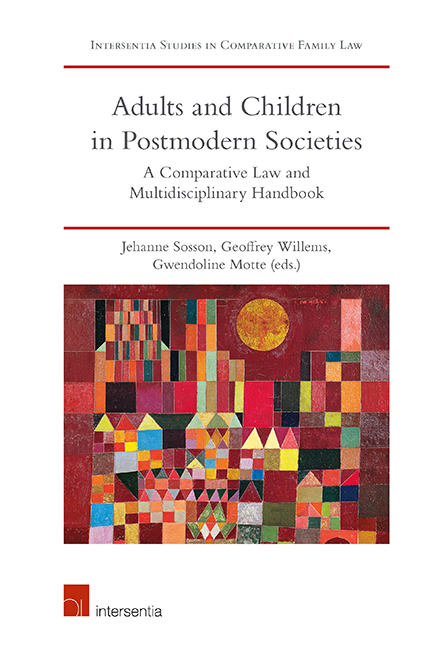Book contents
- Frontmatter
- Contents
- List of Cases
- List of Contributors
- Introduction
- PART I NATIONAL REPORTS ON LEGAL REGULATIONS OF RELATIONSHIPS BETWEEN ADULTS AND CHILDREN
- Questionnaire
- Models
- Algeria
- Argentina
- Australia
- Belgium
- Canada
- Democratic Republic of the Congo
- England and Wales
- France
- Germany
- Ireland
- Italy
- Japan
- The Netherlands
- Romania
- Spain and Catalonia
- Sweden
- Switzerland
- United States of America
- PART II INTERDISCIPLINARY APPROACH
- PART III INTERNATIONAL LAW INSIGHTS
- PART IV COMPARATIVE APPROACH
- General Conclusion: The Challenge of Transparent and Inclusive Parenthood/Parentality in a Pluralist and Cosmopolitan Context
- About the Editors
Argentina
from PART I - NATIONAL REPORTS ON LEGAL REGULATIONS OF RELATIONSHIPS BETWEEN ADULTS AND CHILDREN
Published online by Cambridge University Press: 26 June 2019
- Frontmatter
- Contents
- List of Cases
- List of Contributors
- Introduction
- PART I NATIONAL REPORTS ON LEGAL REGULATIONS OF RELATIONSHIPS BETWEEN ADULTS AND CHILDREN
- Questionnaire
- Models
- Algeria
- Argentina
- Australia
- Belgium
- Canada
- Democratic Republic of the Congo
- England and Wales
- France
- Germany
- Ireland
- Italy
- Japan
- The Netherlands
- Romania
- Spain and Catalonia
- Sweden
- Switzerland
- United States of America
- PART II INTERDISCIPLINARY APPROACH
- PART III INTERNATIONAL LAW INSIGHTS
- PART IV COMPARATIVE APPROACH
- General Conclusion: The Challenge of Transparent and Inclusive Parenthood/Parentality in a Pluralist and Cosmopolitan Context
- About the Editors
Summary
Argentina is a Federal Republic, with 24 provinces, plus the city of Buenos Aires, which is the capital. Each province rules procedural and administrative matters, so there are 24 different procedural laws. Each judge may declare that a law is unconstitutional, but the Supreme Court of the country has the last word. The old Civil Code, dated 1871, suffered a great number of reforms, mainly in family matters. All the same, until now, religions (especially the Catholic Church) have tried to influence civil legislation.
There is only one Civil and Commercial Code (C & CC) for the whole country. The latest has been in force since 1 August 2015. Family relationships are ruled in the Second Book of the Code (Articles 401 – 723), according to constitutional and human rights treaties. This is one of the reasons why religious influence is weaker nowadays.
The reforms to the family and the childhood and adolescence rights have responded to the constitutionalisation of family law. The constitutional view is strongly supported in the National Constitution Amendment produced in 1994, which included in the so-called ‘Constitutionality Block’ of several international human rights treaties which influenced the family and the childhood and adolescence rights: the American Convention on Human Rights; the Convention on the Rights of the Child; and the Convention on the Elimination of All Forms of Discrimination against Women (CEDAW).
Thanks to this new view, Argentina was the first South American country to enact a same-sex marriage law (No. 26.618, from 2010) and a law on gender identity (No. 26.743, from 2012). This view also influenced the law of the Integral Protection of Children and Adolescents (No. 26.061, from 2005).
In this context, the Argentine C & CC has built family legal relationships on the following principles: (1) pluralism, while it recognises different ways of family organisation; (2) equality and no discrimination; (3) freedom of will; (4) family solidarity; (5) the best interests of the child; and (6) progressive autonomy of the child.
These issues are approached in the attached bibliography.
CHANGES IN THE TRADITIONAL FAMILY
A. MOTHERS
1. Is maternity automatically established by the birth certificate?
In general, maternity determination is ruled by the old adage ‘mater semper certa est’ (the mother is always known).
- Type
- Chapter
- Information
- Adults and Children in Postmodern SocietiesA Comparative Law and Multidisciplinary Handbook, pp. 37 - 74Publisher: IntersentiaPrint publication year: 2019



